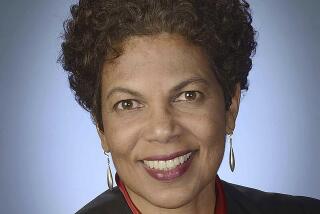Judge Not Amused by Woman’s Claim of Sovereign Authority
- Share via
A routine court hearing erupted into a verbal duel Wednesday between Montana “freemen” disciple M. Elizabeth Broderick of Palmdale and the federal judge who will preside over her trial on fraud and conspiracy charges.
“I’m putting you on notice that you are proceeding without jurisdiction or venue,” said Broderick, who claims she has renounced her U.S. citizenship and need not answer to the federal government. Broderick’s assertion that she can create her own money by writing and selling homemade checks led to her arrest last month.
“I am not lawfully in custody. I was captured and I was kidnapped by foreign agents,” she later told U.S. District Court Judge Dickran Tevrizian in Los Angeles federal court.
Broderick, acting as her own attorney, warned Tevrizian that she is “an ambassador of the Kingdom of Hawaii” as spectators chuckled.
Tevrizian was not impressed. “When you behave like this I have a question in my mind whether you are competent to represent yourself,” he said after silencing Broderick.
Broderick and four alleged accomplices are accused of raking in $1.5 million by charging up to $200 admission each to thousands of persons who attended her regular seminars promoting the use of the homemade checks.
Broderick contends that the checks, which she calls “comptroller’s warrants,” are backed by liens she has placed on government officials. Federal officials say Broderick’s checks are worthless and were inspired by Montana tax resister LeRoy Schweitzer, who is also in custody on federal fraud charges.
His arrest sparked a standoff now in its seventh week between FBI agents and his armed “freemen” followers on a Montana ranch.
Wednesday’s hearing was the first appearance of the defendants before Tevrizian, a judge with a no-nonsense reputation who indicated that he had no patience for Broderick’s novel legal claims.
As the hearing opened, Broderick refused to approach Tevrizian and speak into a court microphone, saying she would not surrender herself to the court’s jurisdiction.
“Just come forward and let’s not play any games,” snapped Tevrizian.
“I just want to be sure that . . . is it OK that I’m not waiving any rights,” Broderick replied, hesitantly stepping forward.
“You’re not waiving anything by coming up to the microphone,” Tevrizian said.
Broderick said she wanted to represent herself with the assistance of Tucson tax resister Paul Mitchell, who is not a licensed attorney. Over Broderick’s complaints, Tevrizian swiftly barred Mitchell from acting as Broderick’s co-counsel.
After arguing that the federal courts and their support system--including the income tax--are illegitimate, the last of Broderick’s codefendants relented Wednesday and accepted the appointment of federally paid defense attorneys.
But Broderick maintained she could represent herself, saying she studied law at the University of Colorado for more than two years and successfully won three cases against the IRS in the U.S. 9th Circuit Court of Appeals.
She told Tevrizian to read the 13th Amendment to the Constitution, which she claims bars lawyers from court, and warned that she was ready to take her case to the Supreme Court.
Replied Tevrizian: “I think you are going to go to the Supreme Court, the way this case is unfolding.”
But when Assistant U.S. Atty. Aaron Dyer referred to a motion filed Tuesday that agents be allowed to use “reasonable force” to take fingerprints and handwriting samples from Broderick and her codefendants, Broderick exploded, telling Tevrizian he was without jurisdiction.
“Let’s get this straight right off the bat,” Tevrizian said. “You are objecting to jurisdiction and venue and that is denied.”
Broderick repeated her objections, saying: “I don’t want any federal agents coming in and applying any force to me.”
“We’re not going to get along very well if we have to shout at each other,” said Tevrizian, warning he would prevent Broderick from acting as her own attorney if she continued.
“This is a judge’s worst nightmare,” said Laurie Levenson, associate dean of Loyola Law School and a former federal prosecutor, when asked for comment. “It’s hard enough to control the courtroom when you have two lawyers duking it out. But when one of the parties doesn’t even know the rules, it’s extremely difficult.”
Levenson said that is why only licensed attorneys are allowed to represent defendants in most cases. “Believe it or not, there are certain things people learn in law school and have to show they know on a bar exam that prepare them to operate in the courtroom.”
More to Read
Sign up for Essential California
The most important California stories and recommendations in your inbox every morning.
You may occasionally receive promotional content from the Los Angeles Times.












